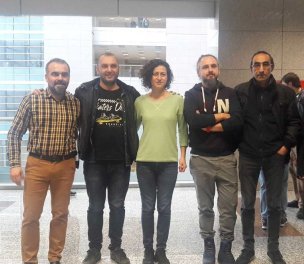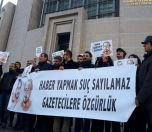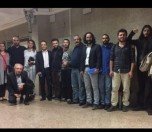Click to read the article in Turkish
Five journalists have been sentenced to prison in the case concerning the leaked emails of Berat Albayrak, a former minister and the son-in-law of President Recep Tayyip Erdoğan.
The İstanbul 29th Heavy Penal Court on December 31 sentenced the journalists for "illegally obtaining personal data" while acquitting them of "propagandizing for a terrorist organization."
In mid-2016, the RedHack group leaked the emails of Albayrak, who was the minister of energy and natural resources at the time.
Six journalists who reported on the leaked emails were put on trial for "illegally obtaining personal data" and "propagandizing for a terrorist organization."
Mahir Kanaat, an employee of the daily BirGün, Tunca Öğreten, an editor for the Diken news portal, Ömer Çelik, the news manager of the now-shuttered DİHA news agency, Metin Yoksu, a reporter for DİHA, Eray Saygın, the former managing editor of the Yolculuk newspaper, and Derya Okatan, the Etkin News Agency's (ETHA) managing editor responsible for legal affairs, stood trial. Okatan has been acquitted of both charges.
Okatan and Kanaat were present in the courtroom in the final hearing and Çelik and Yoksu attended the hearing via videoconference.
The prosecutor repeated their opinion as to the accusations, demanding the penalization of the journalists on both charges. Albayrak's attorney also demanded the journalists be sentenced.
"How can it be a crime?"
Giving her statement about the prosecutor's opinion, Okatan said she was "surprised" by it.
"The prosecutor's office wants me to be punished, predicting that I had been using the ETHA's [social media] account because I was the responsible manager, but there is no proof," she said. "I was put on trial with suspicion and now a punishment is demanded with suspicion.
"Neither me nor ETHA had anything to do with the dissemination of the emails. Let alone spreading them, I don't even have that data. If it's a crime to follow the RedHack account, shouldn't hundreds of people be in this hall right now? Also, how can following an account be a crime?
"Information and documents regarding Berat Albayrak were openly shared and published on Wikileaks. This is news. It should be considered within the scope of freedom of the press."
Trial for "doing our job"
Noting that the trial had begun five years ago, Kanat said all of his digital equipment had been seized despite not containing any evidence that he had spread the emails.
"Moreover, we are journalists. If something is newsworthy, it is reported. We can't be put on trial for doing our job," he said, demanding his acquittal.
Yoksu also said he was charged because of following the RedHack's social media accounts and demanded his acquittal.
"What is in the data?"
Çelik said they were accused of spreading personal data, but "no one looks at what the data is."
"In the data, shipment of weapons, refugees being made political tools, and appointing dozens of people to public institutions not based on merit are in question.
"While the data subject to the news should be processed as a crime, the journalists who made these reports are put on trial."
Other journalists and their attorneys also demanded acquittal.
The court ruled that the sentences of the journalists should be deferred and the five journalists should be subject to judicial control for two years.
What happened?The six journalists were detained on December 25, 2016, for reporting on Albayrak's leaked emails. After 24 days in detention, Öğreten, Kanaat and Çelik were remanded in custody while the others were released. The journalists were charged with committing a crime in the name of the Revolutionary People's Liberation Party-Front (DHKP-C) and the Fetullahist Terrorist Organization (FETÖ) while not being members of these groups. The files of three other people —Deniz Yücel, a reporter for Die Welt, journalist Fatih Yağmur and a person identified with the codename "Unknown Person" — who were remanded in custody in the same investigation were later separated. The indcitment was prepared six months later and the first hearing was held on October 24, 2017. Ömer Çelik was released after the first hearing. Tunca Öğreten and Mahir Kanaat were released on probation after the second hearing on December 6, 2017. Önder and Kanaat's individual applications to the Constitutional Court were dismissed. |
(HA/VK)




.jpg)




